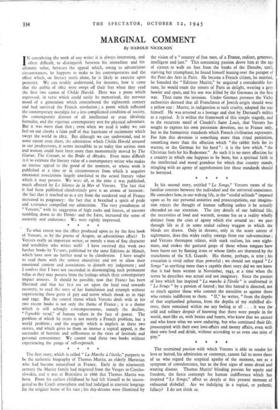The first story, which is called " La Marche a
ritoile," purports to be the authentic biography of Thomas Muritz, an elderly Moravian who had become naturalised in France. Early in the nineteenth century the Muritz family had migrated from the Vosges to Czecho- slovakia, and it was at Bratislava in 1866 that Thomas Muritz was born. From his earliest childhood he had felt himself to be uncon- genial to the Czech atmosphere and had indulged in atavistic longings for the original home of his race ; his day-dreams were illumined by the vision of a " country of free men, of a France, radiant, generous, intelligent and just." This consuming passion drove him at the age of sixteen to walk on foot from the banks of the Danube, until, starving but triumphant, he found himself leaning over the parapet of the Pont des Arts in Paris. He became a French citizen, he married, he founded the " Editions Muiitz," he acquired a considerable for- tune, he would roam the streets of Paris in delight, wearing a grey bowler and spats, and his son was killed by the Germans in the first war. Then came the invasion. Under German pressure the Vichy authorities decreed that all Frenchmen of Jewish origin should wear a yellow star : Muritz, in indignation at such cruelty, adopted the star himself. He was arrested as a hostage and shot by Darnand's militia as a reprisal. It is within the framework of this simple tragedy, and to the recurrent motif of Claudel's Saint Louis, that Vercors has sought to express his own passionate devotion, not to France only, but to the humanistic standards which French civilisation represents. For him this devotion is something more than ritual patriotism, something more than the affection which " the rabbit feels for its warren, or the German for his herd ": it is the love which " the Christian feels for his Redeemer." As such it is no mere affection for a country in which one happens to be born, but a spiritual faith in the intellectual and moral grandeur for which that country stands, mingling with an agony of apprehension lest those standards should be betrayed.
* * * *


























 Previous page
Previous page